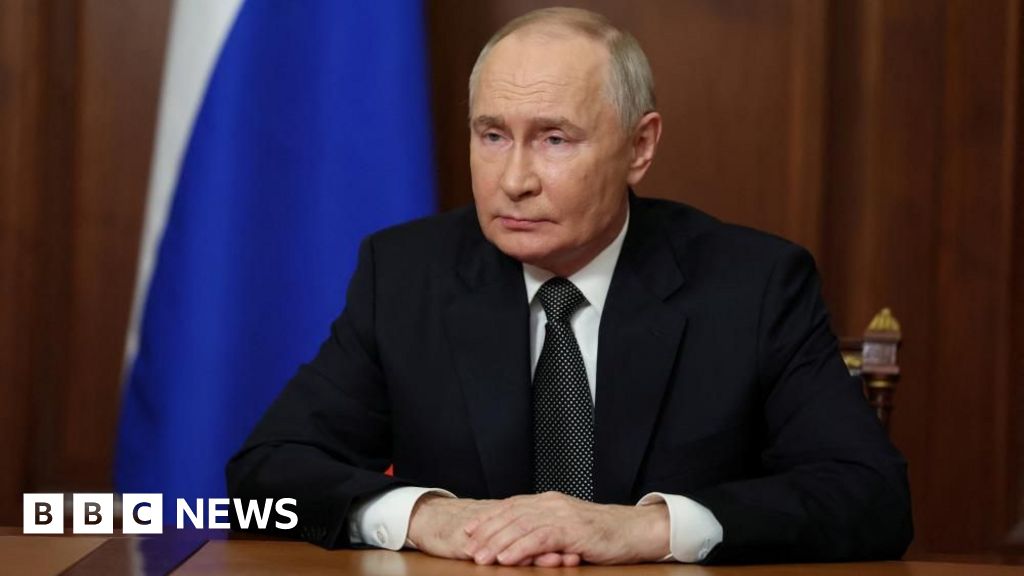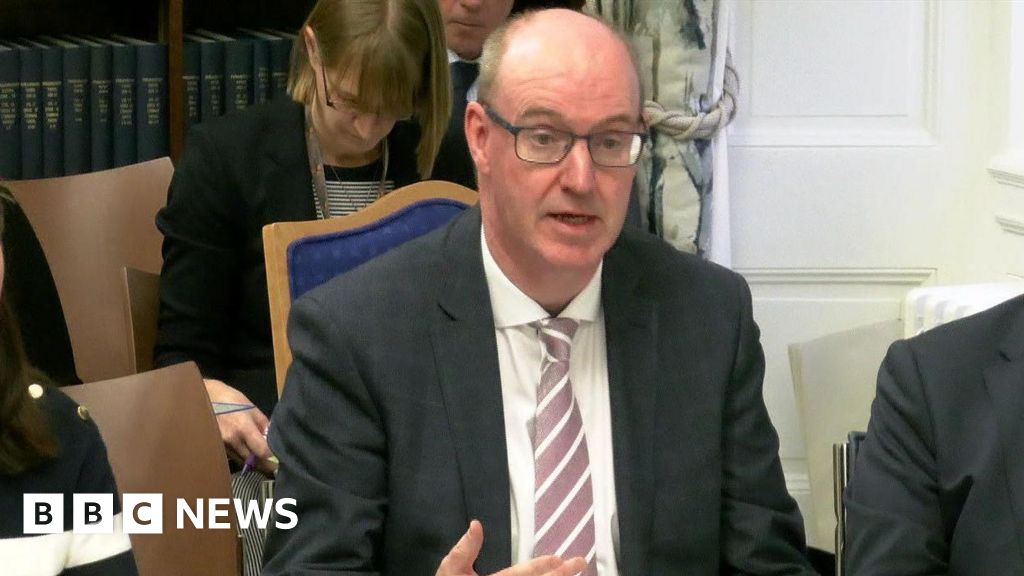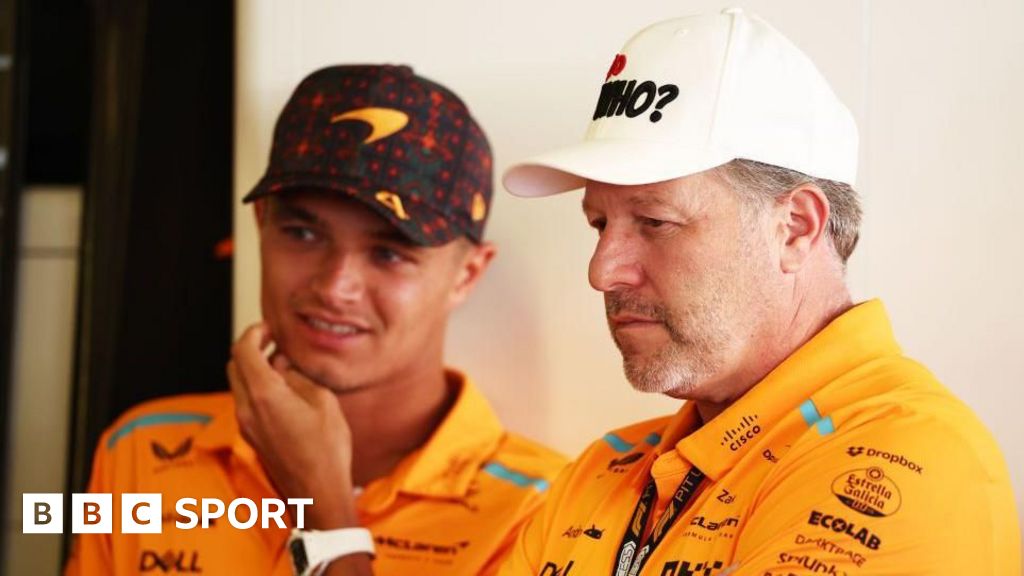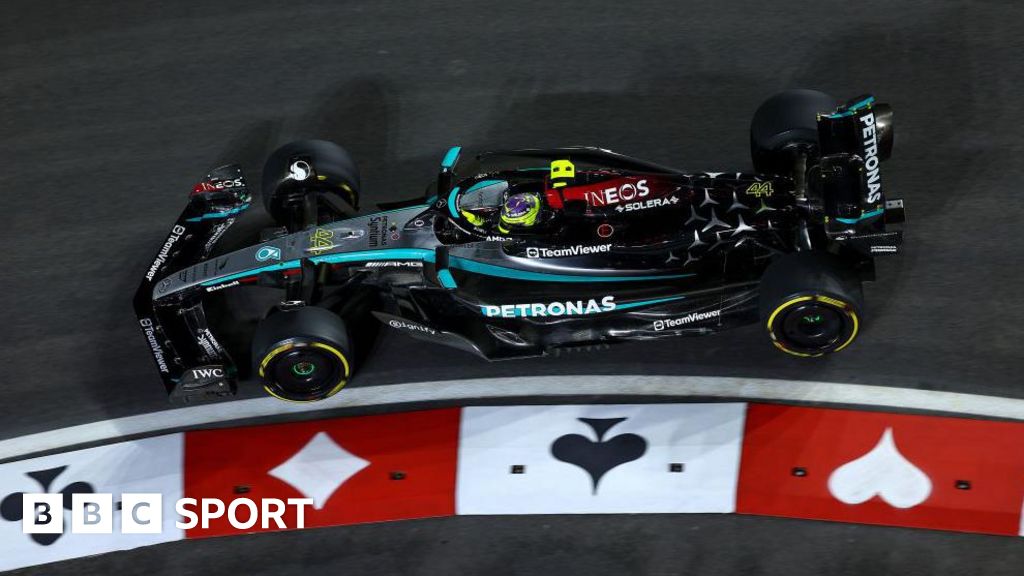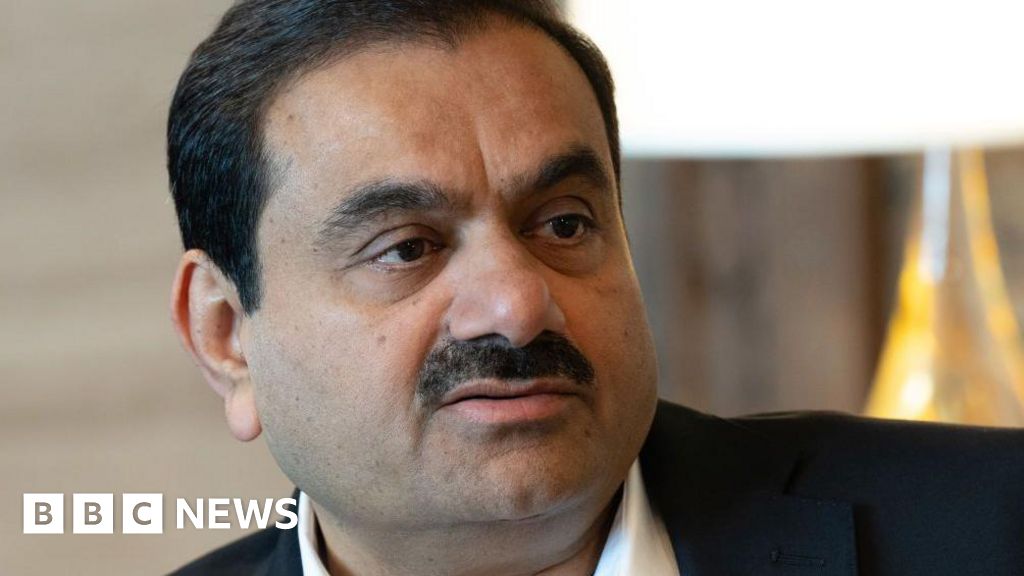
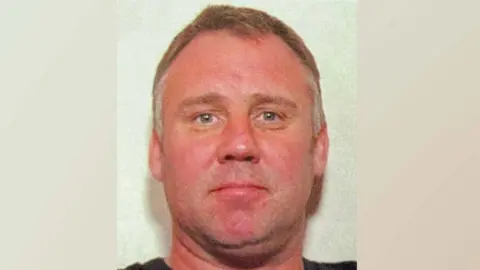 Police Scotland
Police Scotland
Jamie Stevenson was jailed in 2007 for money laundering
In the early summer of 2020, Jamie Stevenson was taking advantage of the lifting of lockdown restrictions to meet associates outside a four-star Glasgow hotel.
They were sitting at a picnic table when they heard shouts and the screech of tyres.
Men in plain clothes were moving rapidly towards them so Stevenson, a notorious crime boss who had reputedly been the target of numerous attempts on his life, took to his heels.
He ran 100 yards before stumbling down a steep grass slope and falling on to a path, where his pursuers brought his flight to a halt.
An investigator who witnessed the scene said Stevenson had thought he was going to be "taken out".
"Once we got hold of him, he was relieved it was the police," the investigator said.
Stevenson was taken to England and was no doubt relieved a second time when the authorities released him on bail.
Within a month, the veteran criminal - nicknamed the Iceman - had fled abroad.

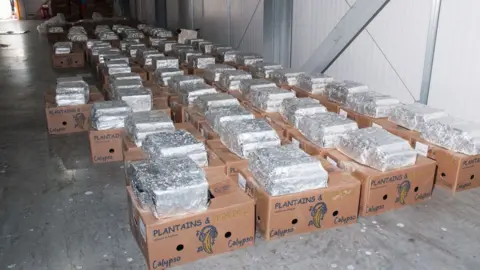 Crown Office
Crown Office
Nearly a tonne of cocaine was found hidden in 119 foil packages in a shipment of bananas
He spent 18 months on the run until Britain's version of the FBI, the National Crime Agency (NCA), tracked him down in the Netherlands.
Dutch national police grabbed Stevenson while he was out jogging with another Scottish fugitive, convicted killer Dean Ferguson.
Stevenson had thought he was safe and was said to be shocked to find himself back in custody, this time with no chance of escape.
Now he has been jailed for 20 years for masterminding an international cocaine smuggling operation where the drugs were hidden in a shipment of bananas, and setting up a drugs factory in England.
There are parts of this story which read like a darkly satirical crime thriller but Stevenson was very much the real deal - a top-level gangster who made a fortune from trafficking drugs linked to hundreds of deaths.
The man dubbed a real-life Tony Soprano tried to flood Scotland with a tonne of cocaine estimated to be worth £100m and millions of deadly Etizolam tablets. This happened in 2020, the year the country suffered its worst ever drugs death toll.
In 2019, Etizolam, better known as street valium, had been implicated in 756 deaths, half that year's total. By the end of 2020, it had been linked to 814.
Police are convinced that had Stevenson succeeded, many more people would have lost their lives while he raked in millions of pounds.

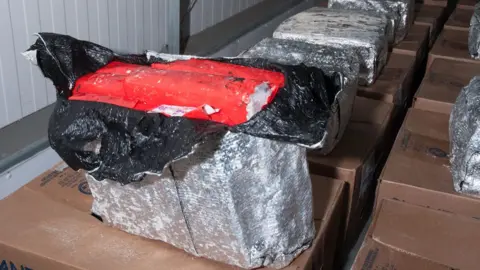 Crown Office
Crown Office
Det Ch Supt Dave Ferry of Police Scotland said: "Serious and organised crime ruins lives, kills people and leaves families devastated.
"Has this operation saved lives in Scotland? I think you can definitely say that."
Stevenson, 59, and his gang were brought down by four years of intensive police work, international co-operation between law enforcement agencies, the infiltration of an encrypted messaging service and an overwhelming body of evidence presented by Crown Office prosecutors in court.
The public first heard Stevenson's name after he was accused of shooting his criminal associate Tony McGovern outside a Glasgow pub in September 2000.
Stevenson and McGovern had once been so close they were the best man at each other's weddings. The murder charge was later dropped because of a lack of evidence.
In 2004, the Scottish Crime and Drug Enforcement Agency launched Operation Folklore, a three-year investigation which targeted Stevenson with unprecedented electronic surveillance and forensic financial analysis.
Boxed into a legal corner, Stevenson pleaded guilty to laundering £1m of drugs money and was jailed for 12 years and nine months.
By 2018 Police Scotland and the National Crime Agency had formed an organised crime partnership based at the Scottish Crime Campus at Gartcosh in North Lanarkshire.
The aim was to take down top-tier criminals. Stevenson was out of prison and on their list.
Their big break came after they received intelligence that a Glasgow fruit merchant, David Bilsland, had links to organised crime and was trying to further his business interests in South America.
Operation Pepperoni was launched. Read nothing into the comical name, which was chosen at random.
Bilsland was planning to import consignments of bananas from Ecuador, close to the cocaine producing countries of Peru, Bolivia and Colombia.
Experts told the Pepperoni team it was a loss leader; only supermarkets could turn a profit by bringing in bananas from South America.

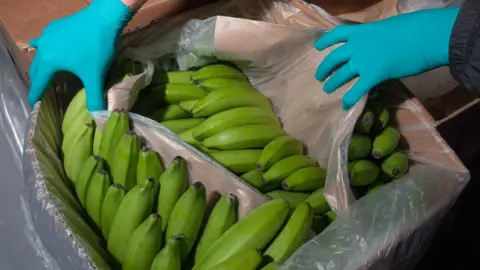 Crown Office
Crown Office
The drugs were hidden inside boxes of bananas
In February 2020, the police and NCA became aware that Bilsland was making an unusually brief visit to Spain, flying out on Valentine's Day and coming back the next. He wasn't taking bags and it was assessed to be “a criminal matter".
They didn't know who Bilsland was going to meet but at the request of the NCA, Spanish police secretly photographed the two men at Alicante's Melia Hotel and sent the pictures back to Scotland.
Bilsland was with none other than Jamie Stevenson.
Asked how his team felt when they heard the news, Det Ch Supt Ferry said: "It was a relief that we knew who he was meeting. That kicked the investigation into a different level."
Around this point, two different strands of this case began to converge.
Through conventional intelligence gathering, the police learned Stevenson had been involved in setting up a pill factory which was churning out millions of Etizolam tablets in Rochester in Kent.

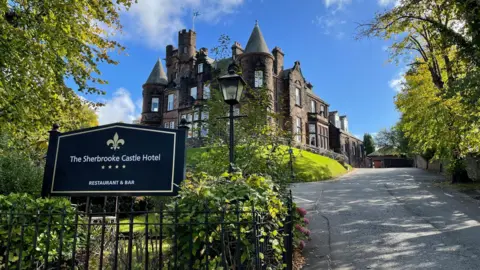
Stevenson was arrested after running from plain clothes officers at the Sherbrooke Castle Hotel in Glasgow
The factory was raided on 12 June 2020. That same day, police arrested Stevenson as he ran from the picnic table at the Sherbrooke Castle Hotel in Glasgow.
He was carrying a phone which turned out to be an Encrochat device.
Encrochat was a highly secure encrypted messaging platform used by criminals who felt able to communicate with each other without fear of being caught.
Each device had a handle, chosen at random. Stevenson's were "elusiveale" and "bigtastey".
He was so confident it was safe, he sent someone an image of his own driving licence via the platform.
In April 2020, French law enforcement had infiltrated the system. They harvested vast quantities of incriminating data and shared it with colleagues around Europe.
On 12 or 13 June 2020, Encrochat's administrators became aware the system had been compromised and advised their customers to turn off and dispose of their devices. The warning came too late for Stevenson.
The raid on the pill factory in Kent meant it was an English case, so Stevenson was taken south of the border. After being released on police bail, he fled the country.
Scottish investigators say that under the English system, there wasn't enough evidence to justify his being kept behind bars at that early stage of the inquiry.

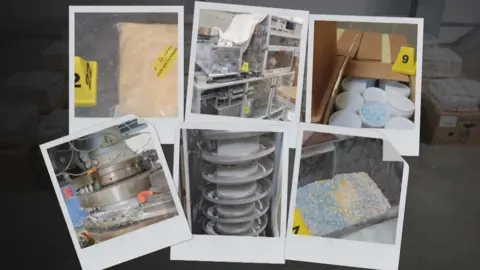 NCA
NCA
A factory in Kent had been producing millions of Etizolam tablets
That summer, UK Border Force officials kept a close eye on the consignments of Ecuadorian bananas coming into Dover addressed to David Bilsland's business in Glasgow.
They searched several to no avail until the 18th shipment was found to contain nearly a tonne of cocaine hidden in 119 foil packages.
In the months that followed, the organised crime partnership analysed 50,000 pieces of Encrochat data, a painstaking process titled Operation Dragonfire.
Stevenson's Encrochat conversations with his associates yielded evidence which proved their involvement with the cocaine and Etizolam.
The group's top tier was ensnared, along with people further down the ladder like Bilsland.
Appeal court decisions in England had upheld the admissibility of Encrochat evidence and it was not challenged in the high court in Glasgow, where Stevenson and his colleagues eventually pleaded guilty.

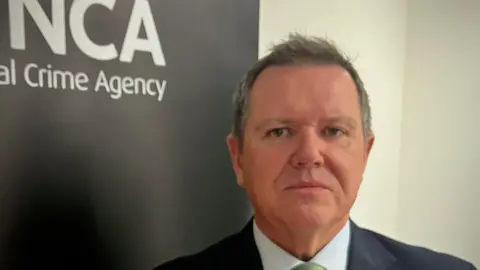
Gerry McLean is the NCA's regional head of investigations in Scotland and Northern Ireland
The NCA's regional head of investigations in Scotland and Northern Ireland, Gerry McLean, said Stevenson was operating at the top table of organised crime north of the border.
He was on an "upward trajectory" and re-establishing himself after his 2007 jail term.
"What I think this conviction demonstrates is that he truly had a global international reputation," said Mr McLean.
"He would not have been able to bring these amounts of drugs into the UK if he didn't have that network of contacts right around the world."
He said the pill factory in Kent had been manufacturing "industrial quantities" of Etizolam.
"The venture that Jamie Stevenson was involved in was of a scale that I don't think we've seen before, certainly in Scotland and really within the United Kingdom."


Deputy procurator fiscal Sineidin Corrins said the case against Stevenson was "watertight"
Deputy procurator fiscal Sineidin Corrins leads the organised crime unit at the Crown Office, Scotland's prosecution service.
"These convictions are monumental. Jamie Stevenson and his criminal gang were involved in drug trafficking on an industrial and a global scale," she said.
"It's also a marker from law enforcement and the criminal justice in Scotland.
"Collaboratively, all the preparation and effort brought this serious organised crime gang into the dock at the high court. The evidence was presented in a way that was absolutely watertight."
Det Ch Supt Ferry said Stevenson would have made tens of millions of pounds during his long criminal career.
The next step will be for the Crown to pursue Stevenson's assets under proceeds of crime legislation.
Its success will depend on what can be found and what can be proved in court.

 1 month ago
12
1 month ago
12
